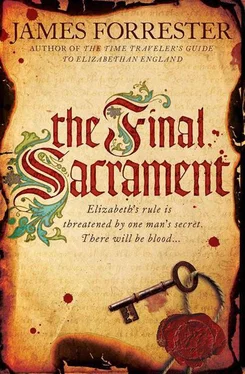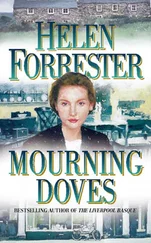James Forrester - Final Sacrament
Здесь есть возможность читать онлайн «James Forrester - Final Sacrament» весь текст электронной книги совершенно бесплатно (целиком полную версию без сокращений). В некоторых случаях можно слушать аудио, скачать через торрент в формате fb2 и присутствует краткое содержание. Жанр: Исторический детектив, на английском языке. Описание произведения, (предисловие) а так же отзывы посетителей доступны на портале библиотеки ЛибКат.
- Название:Final Sacrament
- Автор:
- Жанр:
- Год:неизвестен
- ISBN:нет данных
- Рейтинг книги:5 / 5. Голосов: 1
-
Избранное:Добавить в избранное
- Отзывы:
-
Ваша оценка:
- 100
- 1
- 2
- 3
- 4
- 5
Final Sacrament: краткое содержание, описание и аннотация
Предлагаем к чтению аннотацию, описание, краткое содержание или предисловие (зависит от того, что написал сам автор книги «Final Sacrament»). Если вы не нашли необходимую информацию о книге — напишите в комментариях, мы постараемся отыскать её.
Final Sacrament — читать онлайн бесплатно полную книгу (весь текст) целиком
Ниже представлен текст книги, разбитый по страницам. Система сохранения места последней прочитанной страницы, позволяет с удобством читать онлайн бесплатно книгу «Final Sacrament», без необходимости каждый раз заново искать на чём Вы остановились. Поставьте закладку, и сможете в любой момент перейти на страницу, на которой закончили чтение.
Интервал:
Закладка:
Cecil looked at Walsingham. “I too would very much like to know.”
Walsingham looked reluctant to speak. But he had no choice. “Mr. Clarenceux went to Thame Abbey two days ago supposedly to hand the document over to a Catholic conspirator. As Sir William is aware, he gave us prior warning. I was greatly alarmed and had a large number of men standing guard. But as I watched, the building burst into flames-with Clarenceux and his Catholic contacts inside. There was nothing we could do. There were explosions. We formed a chain to bring water from the fishponds to fight the blaze, but the refectory and everything inside it was lost in the intense heat. It was when I heard the explosions that I knew that the fire was not accidental. Clarenceux had led his contacts there to destroy them. The girl whom we found confirmed these things.”
Elizabeth was silent. “And the document? The supposed proof?”
“Mr. Clarenceux certainly took it into the abbey. But there were two other people with him, besides the girl: a gentleman by the name of John Greystoke and a woman, whom the girl informed me was called Joan Hellier. Both must have perished in the flames. I presume the document was destroyed with them.”
“Presumption is not enough, Mr. Walsingham.”
Sir William broke the uneasy silence that followed, shifting in his chair and wincing with the pain in his foot. “I can say nothing about the document but I can say something about the late Mr. Clarenceux. He may have been a supporter of the old religion, but he was not a revolutionary. He did not want to use that document to further the Catholic cause. If that had been his plan, he could certainly have done so to good effect. But he refused. He came to me recently; he was distraught. Seeing the danger, I insisted that he surrender the document to me rather than risk it falling into his enemies’ hands. He would not. I told him he had no other option but to bring the business to a final conclusion. It now appears that he has done exactly that. That is why I too presume he took the document into the fire with him.”
Walsingham spoke. “A message was taken to Clarenceux in the abbey by the girl just before the fire. It was a date, the thirtieth of June last year-but what it signifies, I do not know.”
The logs on the hearth crackled. “We need to know,” Elizabeth said, walking around the back of Cecil’s seat. “We want to know everything-what happened, whether this man was loyal or a traitor. We must know if that document has been destroyed. Interrogate anyone who had dealings with him-anyone to whom he might have slipped it before he climbed onto his heretical pyre.”
“Your Majesty, it will be done,” said Walsingham, looking at Cecil. “To that end I shall now take my leave of you, with Your Majesty’s permission.”
“You have it.”
Walsingham bowed and left the chamber.
The sound of the door closing echoed away. Elizabeth walked back to the fire. “We see that he remembers his manners when taking his leave.” She resumed her seat and sat in thought. “Sir William, it is not just the document we need to know about. It is the truth-the whole truth. We feel naked. No matter what clothes we use to adorn this royal body, the truth makes us feel that we are open to the view of all our subjects. ‘The queen is this, the queen is that.’ We cannot escape their suspicions, their name-calling, their disrespect. We can pretend that lies do not touch the woman inside us, but the truth-the truth strips us of all defenses and leaves us exposed. If this document is indeed reflective of what happened all those years ago, and we are illegitimate, then we have no right to rule. The truth in time will overwhelm us, and we will be destroyed, clinging to our crown for the sake of our own personal safety. But we do not believe it. We believe we have a right to rule, and we believe that our rule-though it be sometimes affected by our weaknesses-is that of God, and that people trust us to rule in the eyes of God. You must find out whether our self-belief is justified or not.”
“You are England’s ordained queen; no one can doubt that,” Sir William replied carefully. “Moreover, you are your father’s only surviving child. No one can doubt your right to rule-neither for dynastic reasons nor in the name of God.”
“Every Catholic in England doubts it. Our cousin Mary doubts it. Her late husband Lord Henry Stewart doubted it.”
“Ah, yes. Lord Henry. We will need to send someone to the Tower to tell his mother. My wife knows her. I will ask her to perform that duty.”
Elizabeth approached Cecil. “You are avoiding our question, Sir William. Perhaps we did not express it sufficiently clearly. Tell us, in truth, did our mother marry Lord Percy?”
Sir William felt as if he had been struck in the chest. Words failed him. He tried to force himself to tell the queen what she yearned to hear, but then he looked up at her and could not bring himself to lie.
“I believe so.”
Elizabeth was silent for some seconds. “It exposes our humanity, does it not?”
“I do not know what you mean.”
Elizabeth closed her eyes. “It reveals our fears and anxieties so clearly, and so fully. A political life is one of an intensified conscience, in which all the worries of the painful day and the tumult of the soul are thrown together, and we have to exist between them, from moment to moment. We despair, Sir William. A man can be a king in every way but a woman who is expected to perform the functions of a king…no. She has to bear the twin weights of her womanhood and the crown which she is not physically capable of bearing. She has to be ruthless where a man would be ruthless, strong-minded where a king would be stern-and yet she has to be a woman too. A king can have children and remarry if his wife dies in childbed, but can a queen make that same reckless decision? We think not. That is why we despair.”
“Your Majesty, do not despair. On your shoulders England’s salvation rests. If you despair, then England despairs. In churches they will despair of the righteousness of their faith. At sea, mariners will despair of the safety of their vessels. Merchants will despair of the fairness of their trade. I cannot counsel you as to what passed between your mother and Lord Percy. However, I do know this. Your reign is founded on hope, not despair. You are the hope of the kingdom-and without you and your faith in yourself as well as in God, England will lose its way.”
“Then let us hope that that part of the past which suddenly causes us so much grief and doubt was consumed in the flames with Mr. Clarenceux. For, as we surmise, if it still exists, it is no longer in his hands, but in those of a Catholic rebel. And then our private doubts will become public fears, and we will be called an impostor queen-without just right or divine grace. And then…” She paused and looked at Cecil in the candlelight. “Then our father’s destruction of our mother will have been nothing but selfishness-the cruel machinations of his ministers-and her self-sacrifice will have been in vain.”
“Your Majesty…” Cecil began, instinctively trying to reassure her. But he had nothing more to say. She had just said it all.
1
Two months earlier
Thursday, December 19, 1566
William Harley, Clarenceux King of Arms, sat at the table in his second-floor chamber, carefully cutting a goose quill. He fumbled as he tried to hold the feather steady, his fingers stiff with cold. Every so often, he looked out the window at the house on the other side of Fleet Street, watching for movement. The uneven quarrels of glass slightly distorted his view, but by shifting his position he could recognize the men coming and going. That house was a three-story, timber-framed building, not unlike his own, but in the middle of a row rather than at the end of one, and southfacing. It had a window in the gable facing the street-very similar to the window he was looking out of, except that it was unglazed. Even though it was sunny today, the shutters were not wholly open. They never were. They seemed never to be wholly closed either. If you compared it with the houses to the left and right, both of which were occupied by couples, there was a marked difference in the pattern of their opening and closing. This was what had alerted Clarenceux four months ago.
Читать дальшеИнтервал:
Закладка:
Похожие книги на «Final Sacrament»
Представляем Вашему вниманию похожие книги на «Final Sacrament» списком для выбора. Мы отобрали схожую по названию и смыслу литературу в надежде предоставить читателям больше вариантов отыскать новые, интересные, ещё непрочитанные произведения.
Обсуждение, отзывы о книге «Final Sacrament» и просто собственные мнения читателей. Оставьте ваши комментарии, напишите, что Вы думаете о произведении, его смысле или главных героях. Укажите что конкретно понравилось, а что нет, и почему Вы так считаете.












